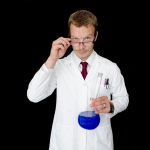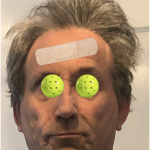Batches of an alcohol-based hand sanitizer were recently recalled due to contamination by methanol, which is too toxic to be used for this purpose. How did the methanol get into batches of alcohol? A look at moonshining can answer this question.
Chemicals & Chemistry
A company called ZBiotic wants you to believe that its product – a microorganism that makes the enzyme that metabolizes acetaldehyde – will help prevent a hangover. Should we believe this?
A new month, a new chemical to fear. Such is the business plan of the Environmental Working Group, an organization that I've been saying unflattering things about for years. Why? Because it usually deserves it. Let's look at a just-released EWG video, which shows the kinds of tricks those guys have been using (and fooling us with) forever.
Pharma companies have taken to combining over-the-counter drugs into the same pill or bottle and charging higher prices. There's little evidence this marketing practice benefits anybody but said pharma companies. There's a new pesticide scare loose in the headlines: the weedkiller paraquat allegedly causes Parkinson's Disease. It's a phony scandal cooked up by activists and trial lawyers.
Environmental activists rely on several go-to tactics when fomenting fear of pesticides. One of their favorite methods is recruiting fake whistleblowers – often retired government scientists – who will spread conspiratorial nonsense about regulatory agencies and other researchers. Here's a real-world example of the "phony whistleblower gambit."
In a move that will significantly expand the restrictions on per- and poly-fluoroalkyl substances (PFAS) – more commonly known as the “forever chemicals” – the International Agency for Research on Cancer has reclassified perfluorooctanoic acid (PFOA) as “carcinogenic to humans.” It did so even though no valid studies show it increases the risk of causing cancer in people. How will this reclassification increase pressure in Europe and the U.S. for more action? Here's a look.
A teenager died recently after taking the "One Chip Challenge," eating Paqui's uber-spicy tortilla chip and going as long as possible without eating or drinking anything else. The cause of death remains unclear, but there's an interesting lesson here about the uselessness of "non-GMO" food labels. Meanwhile, actress Jessica Biel sells all-natural Tylenol — which is identical to plain ole' Tylenol. Another case of dubious health marketing? Yep.
A recent, bizarre murder case in Minnesota involved a physician (a poison expert) accused of poisoning his wife with a toxic gout drug called colchicine. The fact that she didn’t have gout, and that he had taken out a $500,000 life insurance policy, won’t help Dr. Connor Bowman‘s defense much. And a little lesson on the risks of using toxic drugs therapeutically.
Garlic is an enormously popular spice and food ingredient. But have you ever noticed that hours after someone eats it, their breath starts to smell strangely funky? And there's no sense in grabbing for the mouthwash; it won't do a thing. What is going on here?
I have previously authored many articles about per- and polyfluroalkyl substances (PFAS), also known as “forever chemicals,” and the misinformation and lack of scientific credibility surrounding them. However, Europe has outdone the U.S. on the absurdity of their proposed regulations on these chemicals. On February 7, 2023, the European Chemicals Agency (ECHA) proposed to ban all PFAS, which would affect more than 12,000 chemicals. To do this, they used a definition of PFAS so broad that it includes almost any chemical that contains fluorine [1]. What is going on?
New Covid variants are once again emerging, suggesting that a late summer surge is imminent. Why does this keep happening? Some of it can be explained by a simple chemical reaction that would be taught in any standard organic chemistry course.
It's no secret that pickleball is a national craze. But, how many chemists are willing to try it and not only write about their experience but also the chemistry of the ball?











